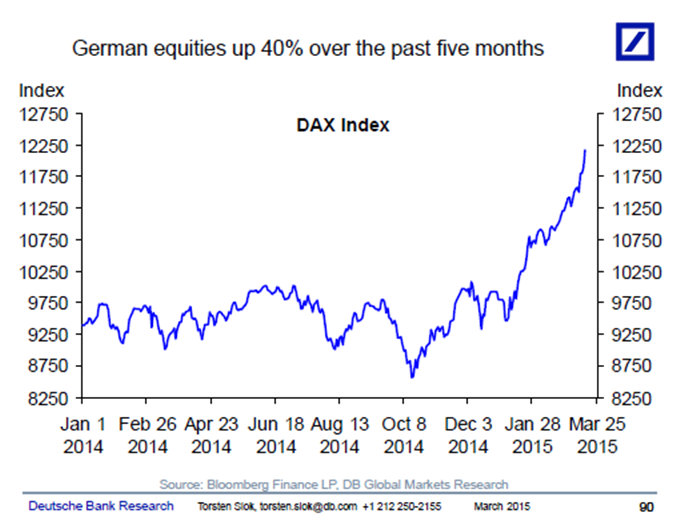German Equities Up 40% Over Past Five Months
March 24, 2015 12:30pm by Barry Ritholtz
This content, which contains security-related opinions and/or information, is provided for informational purposes only and should not be relied upon in any manner as professional advice, or an endorsement of any practices, products or services. There can be no guarantees or assurances that the views expressed here will be applicable for any particular facts or circumstances, and should not be relied upon in any manner. You should consult your own advisers as to legal, business, tax, and other related matters concerning any investment. The commentary in this “post” (including any related blog, podcasts, videos, and social media) reflects the personal opinions, viewpoints, and analyses of the Ritholtz Wealth Management employees providing such comments, and should not be regarded the views of Ritholtz Wealth Management LLC. or its respective affiliates or as a description of advisory services provided by Ritholtz Wealth Management or performance returns of any Ritholtz Wealth Management Investments client. References to any securities or digital assets, or performance data, are for illustrative purposes only and do not constitute an investment recommendation or offer to provide investment advisory services. Charts and graphs provided within are for informational purposes solely and should not be relied upon when making any investment decision. Past performance is not indicative of future results. The content speaks only as of the date indicated. Any projections, estimates, forecasts, targets, prospects, and/or opinions expressed in these materials are subject to change without notice and may differ or be contrary to opinions expressed by others. The Compound Media, Inc., an affiliate of Ritholtz Wealth Management, receives payment from various entities for advertisements in affiliated podcasts, blogs and emails. Inclusion of such advertisements does not constitute or imply endorsement, sponsorship or recommendation thereof, or any affiliation therewith, by the Content Creator or by Ritholtz Wealth Management or any of its employees. Investments in securities involve the risk of loss. For additional advertisement disclaimers see here: https://www.ritholtzwealth.com/advertising-disclaimers Please see disclosures here: https://ritholtzwealth.com/blog-disclosures/



1. “Combined with the euro depreciation and lower oil prices it all points to more upside risk to the economic outlook for Europe.” – Doesn’t 25% fall in Euro negate more than half of the price drop in Brent? If oil price drop in this equation is “plus”, then the FX rate should be a “minus”
2. “German stocks have increased 40%…Combined with the euro depreciation and lower oil prices it all points to more upside risk to the economic outlook for Europe.” – Stock prices point to upside of the economic outlook? Stocks drive economy up – this seems to me tail wagging the dog…. Unless, of course, you subscribe to the magic “confidence” theory that approximately states that once the asset prices rise high enough, the people will spend enough to jump start the economy. (I personally will believe this only after a major country – be it USA, Japan, or EU – successfully achieves the “escape velocity”, which none of them have done. I also think that there will be a revolt long before sufficient “wealth” trickles down to the bottom 90%)
Few other “thoughts:”
1. If you superimpose this chart with USD/EUR or inverted EUR/USD, the gain doesn’t look nearly as impressive
2. All the “hot money” and the ECB “liquidity” found a new home.
3. Another proof that this has been a QE-driven world for 6+ years. Both the Japanese experience and more recent US experience (QE2, “Twist:, QE3, QE3.5 and finally the most recent “patient” FED meeting) suggest that once delivered in large quantity, the QE cannot be stopped. Until, of course, a force far greater than the Central Banks comes into play. Trade accordingly.
a pretty impressive chart, but I wonder if the takeoff point coming at about the time that the US economy kicked into a higher gear is indicative of the US economy (and the soaring USD) pulling German export business upward, or if the chart shows widespread global demand for German products.
Given the chaos that would ensue if the Greeks and Germans cannot come to an agreement on what to do about the Greek debt (which the Greeks cannot pay, and most of it is to German banks (who made loans that they ought not to have)), I cannot believe that we are seeing risk-free growth in the German business sector. It could also easily be a flight of capital from negative-rate bonds to stocks, which might propel the German economy forward, or it might not, but it certainly is money that could move out of stocks as rapidly as it has moved into them.
Hard for a foreigner to know the answers to these things, or to have a good idea of how “high” is “high”. Are the UK or Scandinavian stock markets displaying similar growth?
Where are the Germans who sit in cash, buy gold, and rail at Merkel?
http://www.nytimes.com/2015/03/23/world/europe/right-wing-groups-find-a-haven-for-a-day-in-russia.html
Oh, Russia.
Old school Axis markets on the move! Even Italy is finally on the upswing!
“We taught them a lesson in 1914 and they’ve hardly bothered us since then.”